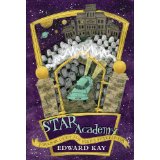The Power of Imagination
I do a lot of science writing and science-fiction writing, often for kids. One of the things that still surprises me is the occasional reaction from people who respect the world of facts, but who think that science fiction is intellectually suspect.
Once, a librarian in Manitoba wrote a review of my sci-fi novel, STAR Academy, disapproving of a plot point in which certain characters had travelled faster than the speed of light. The librarian objected to this on the basis that travelling faster than the speed of light is not known to be possible, the implication being that I therefore should not encourage children to even imagine a universe in which this is conceivable ("Warp drive, Mr. Scott!" notwithstanding).
Several years later, I was involved in a project with Stephen Hawking and Lucy Hawking to adapt their George's Secret Key To the Universe sci-fi novels for an animated series. A television series is a beast with an insatiable appetite for story, so the producers asked me to develop a number of potential story ideas separate from the novels. One of them involved a spaceship flight simulator for George and his friends wherein they got to experience what it would be like to travel faster than the speed of light.
I submitted my story ideas, and a couple of weeks later, I received a batch of Stephen and Lucy's notes via the producers. Even before I had opened it, the sight of that email in my inbox made my pulse race, albeit ambiguously. It's both a thrilling and intimidating experience to receive notes from one of the greatest thinkers of one's era. Will they like it, or will they think it sucks?
After my moment of being starstruck (appropriate reaction, really, given that he's an astrophysicist), I opened the email and read the notes. One of them pointed out that as far as we are currently aware, it is not possible to travel faster than the speed of light. However, the note added that Professor Hawking thought that the story with the lightspeed simulator was really fun and that kids would like it, so to go ahead and write it up. I took a deep breath of relief and happily began writing a story outline.
Professor Hawking's reaction was the opposite to that of the librarian, which seemed doubly ironic given that if anyone should know about whether travelling faster than the speed of light was an absurd thing to write about or not, it would be the theoretical cosmologist who had taken a subject like physics and turned it into a bestseller.
What it indicated to me, among other things, is that Stephen Hawking understood the purpose of science fiction. Science fiction is not a genre that is about things that are, or even about things that can be, but rather about things that could be. And as history has proven time and time again, that which can be imagined often becomes that which is.
Jules Verne might not have precisely sorted out how we would get to the Moon, or what we'd find when we got there, but he nailed it when he predicted that we'd do it. H.G. Wells was unable to provide details of how different living organisms could be combined, but here we are in a world where DNA from a rabbit is being inserted into a house plant to enable it to clean the toxins from the indoor air we breathe. Preventing illnesses by stimulating a human immune system would have been a "science fiction" notion in the 17th century, yet I just had a flu shot at my local supermarket last Friday.
It seems to me that the purpose of science-fiction writing, if it needs to have a purpose at all besides being an extremely fun pastime and an encouragement to literacy, is that it encourages us to dream. And that is a valid end in its own right. There are so many challenges left to overcome, so many amazing things still to discover, so many incredible inventions still to be devised. Just imagine.
